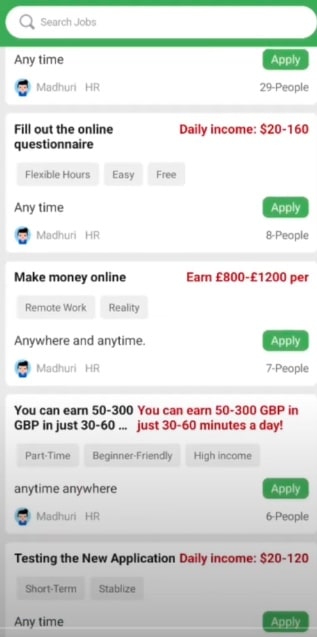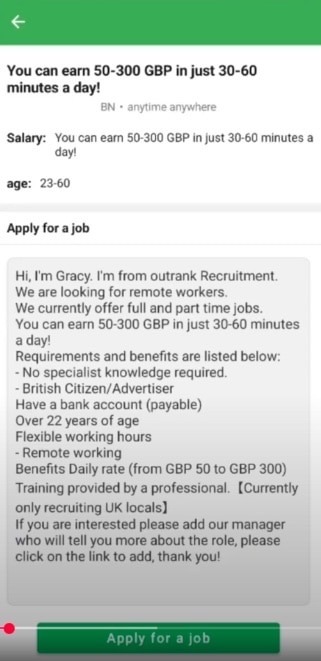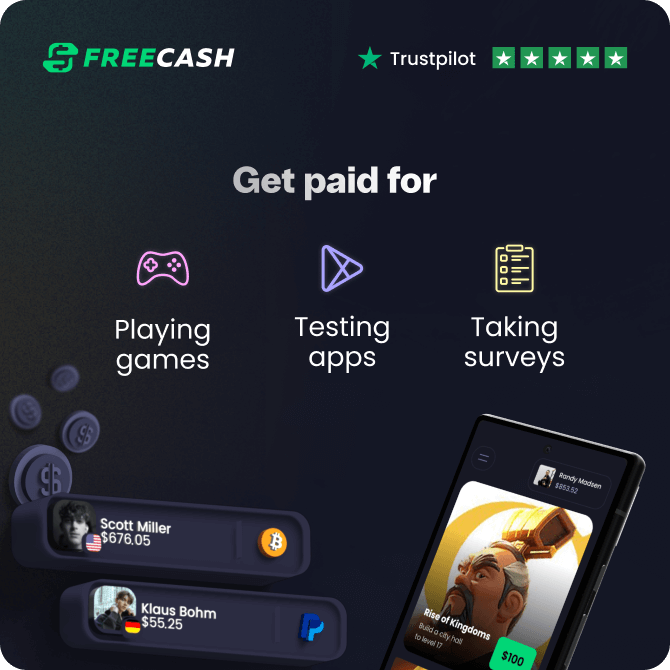
Welcome to my JobDay app review!
Every now and then, a mobile app pops up that seems too good to be true. It promises convenience, simplicity, and, above all, financial benefits.
Enter JobDay, an app that, at first glance, appears to be a godsend for people looking for remote gigs or flexible part-time jobs.
With over 1 million downloads on the Play Store, it has caught the attention of job seekers worldwide.
But here’s the question we need to ask before getting too excited: Is JobDay legit, or is it just another digital illusion dressed up as a job platform?
If you’ve come across this app while browsing for remote work, you probably thought it resembled a job board. It features countless listings promising jaw-dropping pay for seemingly minimal effort.
The interface is neat, the job offers are compelling, and it almost feels like you’ve stumbled upon a secret employment goldmine. But before you start prepping your CV—or actually, don’t bother—you’ll want to read this review to the end.
Let’s unpack JobDay’s promises, how it works, who’s behind it, and what’s going on behind that slick job-hunting interface.
Discover the top 10 reward platforms to make money online!
What Is JobDay Supposed to Be?
According to the description, JobDay helps users easily discover part-time jobs and flexible gigs. Sounds great, right?
Upon opening the app, you see an array of opportunities:
- “Earn $500 to $3,000 in just 36 minutes a day”
- “Make $800 to $1,200 from home—no skills required”

For anyone out of work or just trying to earn extra income, this is a dream come true. But seasoned internet users might immediately raise an eyebrow.
When you see offers like these, you should be skeptical. These kinds of too-good-to-be-true numbers almost always hide something less savory beneath the surface.
A Closer Look at the Jobs
Let’s say you’re curious and you tap on one of these listings. The description is always oddly similar:
“Hi, I’m Gracie from OutRank Recruitment. We’re looking for remote workers. We currently offer full and part-time jobs. You can earn $500 to $3,000 per day in 30–60 minutes. No specialist knowledge required. Must be a British citizen, have a bank account, and be over 22.”

You’re then encouraged to add your manager directly for more details. Wait, what?
Let’s stop here for a second.

This reward platform is going viral! Cash out via PayPal, Visa, Gift Cards, and in-game currencies - Click here to find out how to generate an extra $10+ per day!
Legit job boards do not operate like this. Real platforms, such as Indeed, LinkedIn, or even Upwork, do not require you to add a personal contact to get hired. They ask for your CV, references, and sometimes even a background check.
Here, you don’t submit a resume. You don’t apply through a system. You just… message someone.
And that someone? Her name is “Tina Tina.”
The Telegram Trap
Once you hit the “apply” button, the app doesn’t take you through a hiring process. Instead, it redirects you to an automated chat and then forwards you to Telegram, where you must message a user named Tina Tina.
That’s when things start feeling familiar, especially if you’ve seen other apps like GigMate, WorkSnap, or Range. All of them follow the same pattern.
It’s almost as if someone is churning out identical job board apps under different names, to lure people into this bizarre Telegram wormhole.
And surprise, surprise—none of these apps actually lead to a real job. If you’re lucky, you’ll get ghosted. If you’re unlucky, you might be targeted later.
So Who’s Behind JobDay?
The app is operated by Youssef Boukhira, based in Morocco. Strangely enough, there is no official website, no visible company background, and no terms that clarify the business model.
The only thing you’ll find is a basic privacy policy and an email address—likely a placeholder to meet Google’s listing requirements.
Now think about this for a second. Over one million people downloaded this app. It presents itself as a platform for employment, collects job applications that go nowhere, and directs people to message a Telegram contact instead of submitting a CV.
How is this even allowed to remain on the Play Store?
But If There Are No Ads… How Does It Make Money?
That’s the million-dollar question.
Unlike many scammy apps that bombard you with ads, JobDay doesn’t display any advertisements within the app. So if there’s no ad revenue, how is the developer profiting?
Let’s rewind.
When you message this “recruiter” on Telegram, you’re handing over your phone number and your Telegram ID. And that’s the key.
Apps like this are likely data-harvesting schemes in disguise. They don’t need to show ads to make money—they make money off you. More specifically, provide your contact information.
Once they have your number, they can do several things:
- Sell your data on sketchy marketplaces
- Target you with phishing scams later
- Use your phone number to impersonate or spam
This is why it’s so dangerous. You’ve now handed personal data to someone you don’t know, on a messaging platform you weren’t intending to use for job hunting.
Even if they never reach out, your number could be floating around, ready to be exploited by someone else. It’s not paranoia—it’s digital reality.
What Happens Next? The Illusion of Opportunity
Some users report never hearing back from the recruiter. Others may get further messages asking for more “details,” perhaps even banking info.
While the app itself does not request money, it operates as a funnel system. It draws people into a side channel, such as Telegram, where there’s no oversight.
If a real scam happens, Google can’t monitor Telegram conversations. That’s the loophole.
And once users start sharing sensitive info, it’s game over.
Should You Trust JobDay?
Let’s answer the question we posed earlier: Is JobDay legit?
Absolutely not.
This app is not a job board, not a gig finder, and indeed not a legitimate employment platform.
It is a deceptive funnel designed to harvest your data and exploit your job-seeking vulnerability. There’s no genuine job here; it’s just a mirage—a deception that has already misled over a million people.
Even worse, this isn’t the developer’s first time pulling this stunt. As mentioned, identical apps are already live, operating under different names but using the same scam pattern.
What You Should Do Now
If you’ve already downloaded JobDay, delete it immediately. If you contacted “Tina Tina” or anyone via Telegram, assume they now have your phone number. Be wary of:
- Unfamiliar SMS messages
- Links claiming to be from your bank
- Unexpected “job offers” in your inbox
And whatever you do, never click on unknown links sent via SMS or Telegram. When in doubt, always verify with official sources, such as your bank, or ignore the message.
Final Thoughts
Apps like JobDay prey on hope. They know you’re looking for work, for income, for stability. And they use that need to trick you into handing over valuable information, all while pretending to help.
Google needs to remove these predatory apps from the Play Store. Until then, it’s up to reviewers and users to call them out for what they really are: digital wolves in job-seeking clothing.


